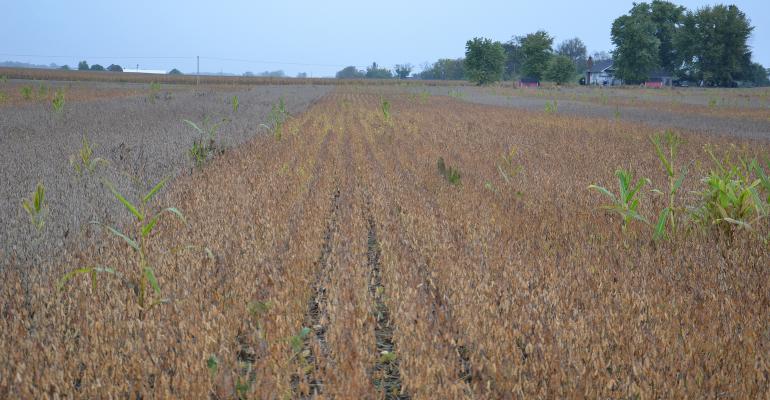Strategies develop around dicamba-tolerant soybeans

Soybean Pest Beat: Panelists give various reasons for considering dicamba-tolerant varieties in 2018.
Tom J Bechman | Nov 14, 2017
I’m not convinced my soybeans with dicamba tolerance yielded any more this year compared to regular varieties. However, I’m considering buying them just for protection in case my neighbors spray dicamba. The seed costs more per acre. I don’t intend to spray a dicamba product on these beans. Is it worth buying dicamba-tolerant soybeans?
The Indiana certified crop advisers panel answering this question includes: Danny Greene, Greene Ag Consulting, Franklin; Andy Like, Amvac agronomist, Knox County; and Jeff Nagel, agronomist with Ceres Solutions Cooperative, based in Lafayette.
Greene: The jury is still out, but here are some points that might weigh in on this decision. Dicamba-tolerant beans are expected to carry a higher market share in 2018 vs. 2017. More varieties with the trait are expected to be available for 2018. Therefore, more of your neighbors may spray dicamba products than in 2017, and more potential off-target damage could occur if your soybeans aren’t protected.
Glyphosate-resistant weed issues are more prevalent than in past years, so having the option of this technology may be an advantage. That said, the potential negative impact on 2017 non-dicamba-tolerant beans is still being evaluated. At this time it’s still unknown what restrictions states will place on application of this chemistry in 2018. [Recently, Indiana made these products restricted-use products for 2018. Later, the Environmental Protection Agency did the same nationwide, plus added certain other restrictions.] If you find the technology hasn’t taken off in your neighborhood, you may choose to pass for 2018.
Like: If you don’t intend to spray dicamba and the yield is the same, I don’t think it’s worth the extra money to plant dicamba-tolerant soybeans. It’s not your responsibility to plant a trait to protect yourself from a neighbor’s off-target applications. Your neighbors have the responsibility to keep the dicamba herbicide that they apply out of your field.
Nagel: Your soybean platform and variety decisions should be based on what you need for your farm. It is the responsibility of anyone making pesticide applications to follow the label and keep applications on-target. We’re seeing some farmers collaborate and discuss what soybean platform they’re planting in 2018, as it does simplify the herbicide application requirements.
In 2017, some of you planted a few fields of dicamba-tolerant or Liberty-tolerant soybeans to get some experience with the platform and genetic yield potential. We saw strong yields out of both of these soybean platforms in 2017.
Controlling glyphosate-resistant marestail, waterhemp, Palmer amaranth and giant ragweed was an issue this past season in many fields of Roundup Ready 2 soybeans. Now we’re seeing a whole-farm shift away from glyphosate-tolerant soybeans to Roundup Ready 2 Xtend or LibertyLink soybeans to achieve better weed control in 2018.
Once you choose a herbicide platform for 2018, don’t forget the basics of evaluating yield potential, the disease package needed and considering the need for quality seed treatments for your farm operation.

